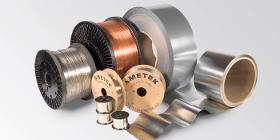- europages
- >
- COMPANIES - SUPPLIERS - SERVICE PROVIDERS
- >
- heat treatment
Results for
Heat treatment - Import export

AMETEK SPECIALTY METAL PRODUCTS
United States
HPM® X-750 is a precipitation –hardenable nickelchromium alloy which is well suited for a wide range of corrosive and oxidizing environments where strength must be maintained to elevated temperatures. The alloy composition provides a product which performs well at elevated temperatures up to 1300° Farenheit. The strength can be increased by heat treatment. The alloy is readily formable in the annealed temper and can be joined by the standard welding and brazing processes. Available Sizes: HPM® X-750 is available from Hamilton Precision Metals as strip product in thicknesses from 0.001” to 0.025” (0.0254 mm to 0.635 mm) in widths up to 12.0” (304.8 mm). The material conforms to AMS 5542, AMS 5598 and UNS N07750.
Request for a quote
AMETEK SPECIALTY METAL PRODUCTS
United States
Beryllium Copper 25 is a Copper base alloy with the capability of being strengthened by precipitation heat treatment. The alloy furnishes the best combination of electrical conductivity, corrosion resistance and mechanical strength necessary for numerous electronic and electromechanical devices. The alloy is quite satisfactory for fabrication with good formability and joining characteristics. Forming is readily accomplished from the annealed temper. Severe bending will be less successful from hard or heat treated tempers and requires large fold radius ratios. Beryllium Copper 25 is able to be soldered, brazed, and welded by most standard techniques. The brazing temperature must be kept under 1450º F and cycle time minimized to avoid loss of heat treated strength. Heat treating should be performed subsequent to welding to obtain uniform high strength. The alloy is not susceptible to an increase in magnetic attraction from plastic deformation during service
Request for a quote
AMETEK SPECIALTY METAL PRODUCTS
United States
HPM® Beryllium Nickel is a Beryllium-Nickel alloy capable of high strength through precipitation heat treatment. The excellent spring characteristics to 550°F make it suitable for many of the most demanding electromechanical devices. The alloy can be readily formed and even deep drawn from the annealed temper. Cold rolled tempers prior to heat treatment can be blanked and folded provided a radius to thickness ratio approaches 2.0. The optimum heat treatment for highest strength is 925ºF for 2 hours. The material can be joined using conventional TIG methods, silver brazed and soldered. Available Sizes: HPM® Beryllium Nickel is available from Hamilton Precision Metals as strip product in thicknesses from 0.0005” to 0.025” in (0.0127 to 0.635 mm) widths up to 7.0” (177.8 mm). A foil product is available as thin as 0.000085” (0.002159 mm) and widths of 4.0” (101.6 mm) maximum. The material conforms to UNS N03360.
Request for a quote
AMETEK SPECIALTY METAL PRODUCTS
United States
Evanohm® R is a unique resistance alloy with high electrical resistivity and very low temperature coefficient of resistivity (TCR). The alloy is produced by melting and conditioning practices which result in a low level of pinholes at ultra-thin thicknesses. This combination of attributes with inherent corrosion resistance makes it suitable for a variety of strain gauge, foil heaters and airbag igniters. The alloy is supplied with 90% cold reduction which has a positive TCR of about 70 PPM/ºC. A stabilizing heat treatment (approximately 475ºC) during manufacture of finished parts adjusts the TCR to a desired value. The heat treatment virtually eliminates any drift tendency of the resistivity. A heat-treat curve for each melt is developed at Hamilton and is made available as a guide in regulating TCR. Sizes Evanohm® R is available from Hamilton Precision Metals as foil and strip product in thicknesses from 0.0005” to 0.010” (0.0127 mm to 0.254 mm) and in widths up to 12.0”
Request for a quote
AMETEK SPECIALTY METAL PRODUCTS
United States
Constantan® is a copper-nickel alloy that contains specific minor amounts of additional elements to achieve precise values for the temperature coefficient of resistivity. Careful control of melting and conversion practices results in a very low level of pinholes at ultra-thin thicknesses. The alloy is used extensively for foil resistors and strain gauges. The TCR can be adjusted from the furnished cold rolled values by using a low temperature heat treatment to achieve compensation for all types of spring elements. The foil is normally supplied with 90% cold reduction and a smooth bright surface. The foil is reasonably flat at 4” wide and nearly free of pinholes. The cold rolled foil can be produced with a TCR between +10 to –35 PPM/°C. The heat treatment will shift the foil TCR to the desired value. A typical heat-treat curve for Constantan® shows decreasing resistivity but increasing TCR with increased heat-treating temperature.
Request for a quoteDo you sell or make similar products?
Sign up to europages and have your products listed
Results for
Heat treatment - Import exportNumber of results
5 ProductsCountries
Company type